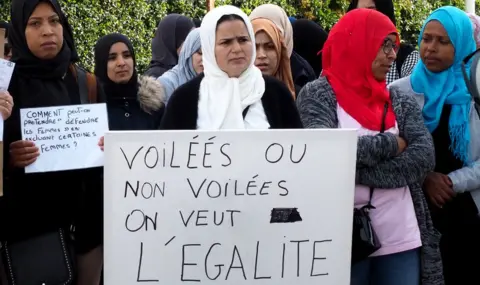Macron warning on stigmatising Muslims amid France veil row
 Getty Images
Getty ImagesFrench President Emmanuel Macron has warned against "stigmatising" Muslims or linking the Islamic religion with the fight against terrorism.
"We have to stand together with all our fellow citizens," Mr Macron said during a joint press conference with German Chancellor Angela Merkel on Wednesday.
It came as a French woman said she was taking legal action against far-right politicians who criticised her for wearing an Islamic headscarf in public.
France has about five million Muslims.
It is the largest Muslim minority in Western Europe.
Wearing the Muslim headscarf or veil - known as a hijab - is banned in French schools, and for public servants at their place of work.
France is officially a secular state and body-covering garments have been at the centre of a number of controversies in recent years.
Last week, a Muslim mother who wore a headscarf during a school trip with her son to the regional parliament in Bourgogne-Franche-Comté in eastern France received verbal abuse from the chamber.
An image of the woman - given the name Fatima - embracing her son was widely shared after footage of the incident was posted on social media.
Allow Facebook content?

It also sparked street demonstrations in the area and has renewed a national debate over the Muslim veil. France currently has no law banning mothers from wearing the hijab on school trips.
On Wednesday, Mr Macron called for a better understanding of the Muslim religion in France and condemned what he described as the "fatal shortcut" of linking Islam with terrorism.
"There is a lot of irresponsibility among political commentators," he said, adding: "Communalism is not terrorism."
Education Minister Jean-Michel Blanquer made clear that the law did not ban women accompanying children from wearing headscarves, although he then said his personal opinion was that wearing a headscarf was "not desirable in our society".
'My son approached me crying'
The incident at the regional parliament building in eastern France occurred during a school trip on Friday 11 October in which Fatima accompanied her young son.
A politician from Marine Le Pen's far-right National Rally - formerly known as the National Front - saw her during a debate and ordered her to remove her veil.
Julien Odoul posted his verbal exchange on Twitter along with a message citing a fatal knife attack on four police officers in Paris earlier this month which has been linked to Islamist radicalisation.
"After the murder of our four policemen, we cannot tolerate this [provocation]," he wrote.
Allow Twitter content?

In an interview with the group Collective Against Islamophobia in France (CCIF), Fatima said she was sitting quietly in a corner of the room when she heard someone shout "in the name of secularism".
"People started screaming and getting upset," she told CCIF (in French), adding: "The only thing I saw was the distress of the children - they were really shocked and traumatised.
"I tried to reassure them... my son approached me and jumped on me, crying. I told them I could not stay."
Her lawyer, Sana Ben Hadj, said her client felt "humiliated" after images of the incident were widely shared.
CCIF said Fatima was filing a complaint in the city of Dijon over "violence of a racial nature committed... by persons with public authority", adding that a further complaint would be filed in Paris for "incitement of racial hatred".
Headscarf part of wider debate
The incident has also sparked a debate over mothers wearing a headscarf going on school trips, when teachers are not allowed to.
The education minister was widely criticised for suggesting the veil was "not desirable", and Marine Le Pen has called for it to be banned on school trips.
A ban on Muslim headscarves and other "conspicuous" religious symbols at state schools in France was introduced in 2004.
It received overwhelming political and public support in a country where the separation of state and religion is enshrined in law.
In 2011, France became the first European country to ban the full-face Islamic veil in public places, while alternatives such as hijabs, which cover the head and hair, remained legal.
Under the ban no woman, French or foreign, is able to leave their home with their face hidden behind a veil without running the risk of a fine.
Former French President Nicolas Sarkozy, whose administration introduced the ban, said veils oppressed women and were "not welcome" in France.

More on Muslim women and the veil:
Correction 20 November 2019: This article has since been updated to make clear that the ban on headscarves in public relates to public servants in their place of work.
